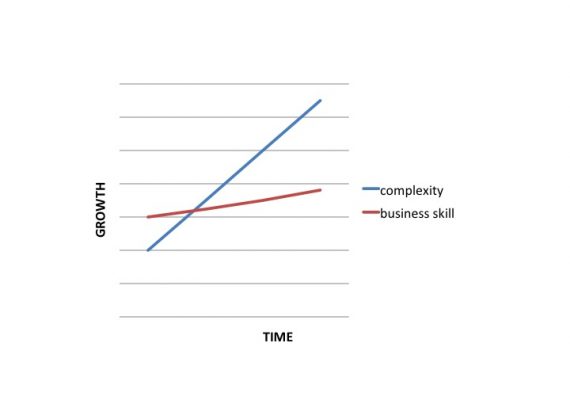The post Business skills and lessons learned appeared first on Paul Terry & Associates.
]]>Do your business skills match your business’ complexity?
I recently shared six tips on this topic and asked other small business owners about their experiences. How did their business skills match the complexity of their business when they first opened? How have they dealt with this tension throughout their business’ evolution? What advice would they want to share with others?
In previous posts Heidi Gibson of The American Grilled Cheese Kitchen and Rachel Saunders of Blue Chair Fruit shared their stories with us. Here are two more business owners tackling complex issues and leveraging their management skills.
Elizabeth Leu
Fiddlesticks
When Elizabeth Leu started Fiddlesticks, a children’s boutique in Hayes Valley, she thought she was prepared. She first worked for someone else and learned as much as she could about the retail business. Elizabeth also took the Renaissance Entrepreneurship Center Business Planning class.
She started her business with a solid foundation of hands-on experience, working for others, and thoughtful planning. Yet she couldn’t prepare herself for what it would actually feel like when she was completely responsible for her own business and all its complexities.
“As a small business owner you have to be the master of all in everything you do, and that’s not easy. You have to wear ALL the hats and ideally, they should all fit. I think management capacity is finding the correct fit with all those hats — and that’s hard! It takes a lot of time and experience to get them all to fit.”
Elizabeth’s advice:
Learn as much as you can about every role in your business.
“You may love only a few of those hats but you have to figure out, master and tolerate them all — at least in the beginning until you can outsource. Once you get strong enough to outsource, you still need to understand how it all works to keep a watchful eye on the whole operation.”
Stay positive and just keep going.
“I have worked very hard to grow my business and I have had some significant setbacks. With every setback I can either choose to learn from it or become bitter and harbor frustrations. I have worked hard to learn from them. All of the setbacks were complex and difficult, especially because it was uncharted territory for me. But I learned and I am still learning. What is it they say, ‘two steps forward, one step back’? As long as you move forward, business complexity feels easier because you keep breaking it down, tackling it piece by piece.”
Claire Keane
Clairesquares
Claire Keane, owner of the artisan, handcrafted sweet treats company Clairesquares, says that her business skills did not match the complexity of her business when she started. She had a steep learning curve. But Claire gained the skills she needed by seeking out specific business knowledge and support and her daily experiences in business brought many lessons learned.
Claire’s key steps for developing core business skills:
Write a business plan.
Claire took the 14-week Business Planning Class at the Renaissance Entrepreneurship Center and wrote a business plan. “To this day, I frequently remember key pointers from each class.”
Join an incubator.
Claire joined La Cocina’s Incubator Kitchen and received the help of that community and all their support services.
Attend lots of workshops.
Claire learned from others to increase her skills. “Whenever there was a workshop relevant to my lack of skills, I made sure to attend it. I was able to take tips from each training and apply it to my business immediately.”
Develop a support team.
Claire knew that she could not do it all alone. “It was very helpful to have a business mentor, new business friends with similar start-up business pains and other friends and family to lean on for advice to get me through the learning curve.”
Keep at it, even through failure.
Ultimately it has been Claire’s tenacity and her perseverance that has made her business a success. “No amount of workshops can prepare you for real world experience. In the end, I learned from trying, failing, and trying again.”
Check out these additional tips on balancing business skills with business complexity. What has worked for you and your business?
The post Business skills and lessons learned appeared first on Paul Terry & Associates.
]]>The post Business advice from the field appeared first on Paul Terry & Associates.
]]>In that tradition, I asked some of my clients and past students to share their thoughts on a common growth challenge for small business owners: balancing business skills with the complexity of the business. I recently shared six key considerations on this topic. I was curious to hear from small business owners in the trenches. How did their business skills match the complexity of their business when they first opened? How have they dealt with this tension throughout their business’ evolution? What advice would they want to share with others?
Here is one story…
Heidi Gibson and Nate Pollak
The American Grilled Cheese Kitchen

When Heidi and her partner Nate opened The American Grilled Cheese Kitchen they already had general business expertise, people management skills and financial management experience but they were new to the restaurant industry and lacked specific industry skills. Heidi and Nate’s approach was to be honest with themselves about their own abilities and get help. “We took a cold hard look at what we did and did not know how to do, and then we recruited advisers who could teach us, or hired staff who already had the skills we lacked.”
Heidi and Nate took a similar approach when opening their second location. They had never run a multi-unit operation before. They sought consulting from other multi-unit operators, and hired general managers for each store who had come from multi-unit backgrounds. “We tasked the managers in the stores with the responsibility of ensuring consistency across the stores, not just within their own. For us, hiring managers who brought experiences and skills to the table that we did not have ourselves was crucial.” With the added complexity of two locations, Heidi and Nate decided to outsource their bookkeeping, too. “We hired a bookkeeper who had deep experience with multi-unit restaurants, which brought more expertise to our operation and freed up our time to handle other issues.”
Just this month Heidi and Nate opened their third location and published a cookbook, Grilled Cheese Kitchen: Bread + Cheese + Everything in Between!
Heidi’s advice for other small business owners:
Be brutally honest about what you are good at and what you’re not.
For the things you are not good at, find a way to outsource them to someone who is good at them. This goes double for bookkeeping and accounting if you are in a high-volume, low-margin business.
Ask for help.
There are a lot of resources out there for growing business owners, including Renaissance, SBDC, ICA and most importantly, other business owners. People want to see you succeed and you’ll be surprised at how much they want to help.
Don’t skip financial forecasting.
Many small business owners underestimate their financial management needs and make mistakes with finances when starting or expanding a business. The worst-case scenario is running out of cash, and sometimes growing can really chew up cash. You’re in a much stronger position to secure financing before you run out of cash rather than waiting until you’re down to the wire. Take the time to forecast cash flow, accounting for your growth needs, and start investigating funding options early rather than late.
Check out these tips on balancing your business skills with your business’ complexity and stay tuned for more words of wisdom from small business owners!
The post Business advice from the field appeared first on Paul Terry & Associates.
]]>The post How to Handle Business Complexity appeared first on Paul Terry & Associates.
]]>
If you start a business slowly, you may be able to handle everything yourself. If you only have one or two products or a limited customer/client base, your systems can be quite simple. But…
- Are you financially sustainable?
- Can you generate enough capital or cash flow to reach break-even?
- Is the business profitable?
To create a self-sufficient business, you may have to scale up or increase your business’ complexity. And as you do so, your business skills and management capacity must keep pace. Getting this balance right is an on-going issue. To grow the small business, things get complicated… perhaps more than you can manage well.
- Is it better to wait until you have all the skills to handle the increased complexity?
- Do you go ahead and grow now and hope that you will develop the skills “on the fly” to be successful and sustainable?
- Should you hire someone with more expertise to help you?
To manage your business’ increasing complexity, it is essential to focus on these six key areas:
1. Pay attention to the your weak links.
Your lack of skills as a small business owner in any key area of your business (management, operations, finances or marketing) can limit your success. There is a good chance you already know your areas of weakness. Cash flow management? Operational systems? Managing others? Take the time to identify a key weakness and make it a strength. (Think about a simple SWOT analysis.)
2. Improve your own business skills now.
Find the help you need NOW before your current knowledge limits your business. This may mean taking a class, reading a book, following relevant blogs, finding a peer mentor, or working with a business adviser or coach. The key is to put aside some regular time (every day, week or month) for your personal education.
3. Bring in others with the skills you need.
Being a small business owner does not mean that you have to know how to do everything yourself or that you have to do it all alone. Often the smartest approach is to hire someone who can do a particular business task better than you. This could be an outside professional or an employee with skills in the specific area of need, such as a bookkeeper to help you manage cash flow, or an employee good at sales. (It may only be a short-term need until your internal systems improve.)
4. Take a leadership role.
You may have started your business because you love making your product. But to create a successful business you may need to hire someone else who can make the product at a cheaper price. This could be an employee that works directly under your supervision, or an outside manufacturer or co-packer. (See these six tips when planning to hire employees and step into a leadership position.)
5. Put good systems in place.
It is challenging to take on larger projects, additional clients or more employees if you don’t have clear (and documented) systems. It is hard to hire someone else to help you if you need to take a lot of time to show them how to do the work because it is all in your head instead of written down. Without good systems, it is also harder to take a break!
6. Don’t stop planning.
Growing a business can sometimes feel like a set of spiral movements around and around—seemingly sending you one place and then another. Yet your business challenges and your careful responses to those challenges can create a great foundation for growth. A solid business plan can also help you predict and prepare for the complexities ahead. Remember, planning isn’t a one-time thing. It helps you to take the pulse of your business—over and over again. So, take the time to identify your weaknesses, challenges and opportunities and create a plan to take your business to the next level.
At Paul Terry & Associates, we work with many small businesses that are confronting the tension between management capacity and business complexity. Some clients are eager to grow their businesses but feel stuck, unsure how to reach the next level or increase sales given current skills or resources. Some clients are struggling to keep up with the demand for their products/services. Using an action planning approach, we work with small business owners to assess the current situation and create a road map to reach their goals. Our goal is to help clients prepare for the road ahead, manage the increasing complexities, and build businesses that are profitable and sustainable for the long term.
The post How to Handle Business Complexity appeared first on Paul Terry & Associates.
]]>
